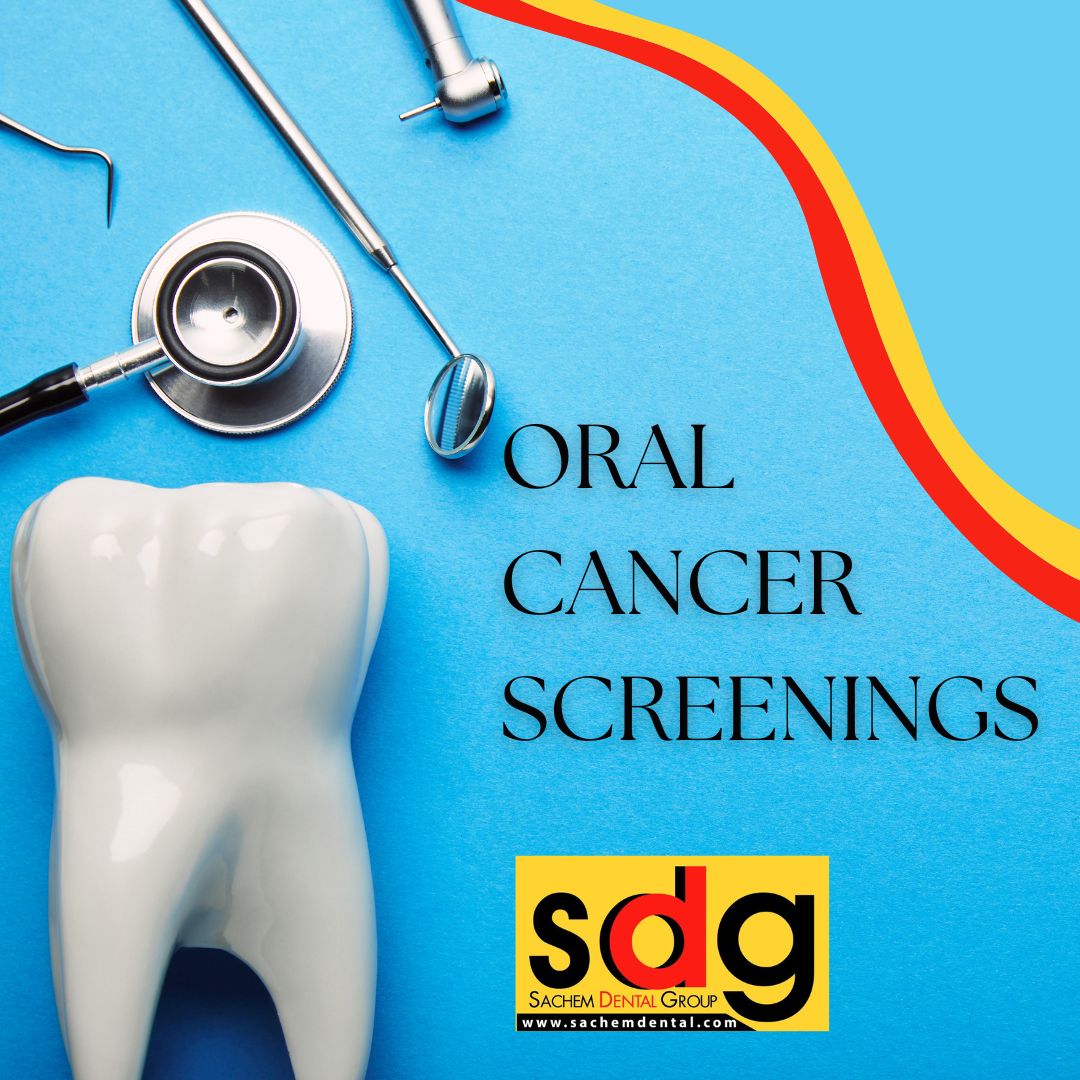
Oral cancer is a serious and potentially life-threatening disease, yet often goes undetected until it has progressed to a more severe stage. Regular oral cancer screenings by a qualified dentist can be crucial in detecting the early signs of this condition. At Sachem Dental Group in Suffolk County, Long Island, we understand the importance of performing an oral cancer screening as part of your regular dental visit. But what exactly is an oral cancer screening? Why do dentists perform them? This dangerous disease should be considered during every single dental exam, regardless of the patient’s age.
What Is an Oral Cancer Screening?
An oral cancer screening is a routine check-up for any signs of oral cancer or premalignant tissue inside of your mouth. During this procedure, your dentist will check for any abnormal changes in the soft tissue in your mouth, such as bumps or sores. They may also feel your neck and face for any lumps or enlarged lymph nodes. Your dentist may also check the inside of your cheeks and lips for any unusual discoloration. If any abnormalities are found, they may take a biopsy to test for cancer cells. An oral cancer screening is a simple procedure that can help detect the early signs of oral cancer, allowing for prompt treatment and improved outcomes.
Why Do Dentists Perform Oral Cancer Screenings?
As part of your regular dental exam, our Long Island dentist will likely perform an oral cancer screening. This is an important part of overall oral health, as oral cancer can be difficult to self-diagnose. Oral cancer screenings are designed to detect any early signs of oral cancer or pre-cancerous tissues, and allow for prompt treatment that can improve patient outcomes. By performing regular screenings, Suffolk County dentists are able to monitor for changes in your oral tissues and detect any signs of disease as soon as possible.
During a dental exam and oral cancer screening, our dentist will visually examine your face, neck, lips, and inside your mouth for any abnormalities, such as lumps or discolored patches of skin. Your dentist may also use special tools such as ultraviolet light to inspect the soft tissues of your mouth more closely. If anything abnormal is noticed, further tests may be ordered to determine if the cells are cancerous or benign.
Oral cancer screenings are quick and painless. While there is no way to prevent oral cancer completely, so regular screenings with our Long Island dentist can help to increase the chances of a successful outcome if it is caught in its early stages. It is important to have a regular dental exam to ensure that any signs of oral cancer are identified and treated as soon as possible.
Signs and Symptoms of Oral Cancer
Oral cancer can be a difficult thing to detect on your own until it’s reached a progressive stage. Which is why an oral cancer screening is so important, as it allows for early intervention and treatment. During a dental exam, our dentist will be looking for any warning signs. Common signs and symptoms include sores in the mouth that won’t heal, white or red patches in the mouth, lumps in the mouth or neck, difficulty swallowing, and unusual bleeding. Other signs and symptoms include a numbness or tingling sensation in the mouth, a feeling that something is stuck in the throat, and voice changes.
It is important to note that these signs and symptoms can also indicate other conditions, and do not necessarily point to oral cancer. However, if you experience any of them, it is important to speak with your dentist about an oral cancer screening during your next dental exam.
Who Should Get an Oral Cancer Screening?
Oral cancer screenings are important for everyone to have during their regular dental exams. However, some people are at a higher risk for developing oral cancer and should be especially diligent about receiving the necessary screenings. Those individuals with risk factors such as smoking, drinking alcohol, or excessive sun exposure should take extra care to get an oral cancer screening during each dental exam. However, extremely healthy individuals who do not meet any of these risk factors can also develop oral cancer. We also know that cancer can be caused by certain types of viruses, such as HPV.
Oral cancer screenings are a key part of preventive care and should be taken seriously by anyone who is at an increased risk of developing the disease. Regular screenings by a qualified dentist can help to detect and diagnose oral cancer in its earliest stages, which can improve the chances of successful treatment. But healthy individuals who do not smoke or drink should also receive normal evaluations during their dental exams.
The Importance of This Vital Process
According to the American Cancer Society, it is estimated that just over 50,000 new cases of oral cancer will be diagnosed each year in the United States. This type of cancer is more common in men than in women, and the risk increases with age. Healthy and younger adults can develop the disease but the average age of diagnosis is 62 years old. Oral cancer includes cancer of the mouth (oral cavity) and the back of the throat (oropharynx). The most common type of oral cancer is squamous cell carcinoma, which starts in the flat cells that line the mouth, nose, and throat. It is important to catch oral cancer in its early stages, as the five-year survival rate for localized oral cancer is about 83%. But if it goes undiagnosed and oral cancer has spread to other parts of the body, the five-year survival rate drops to about 57%. As you can see, early intervention and screening can be life saving.
Reserve Your Oral Cancer Screening Today
If it’s been six months or longer since your last checkup, or you’re unsure when your last oral cancer screening was, call Sachem Dental Group today.
